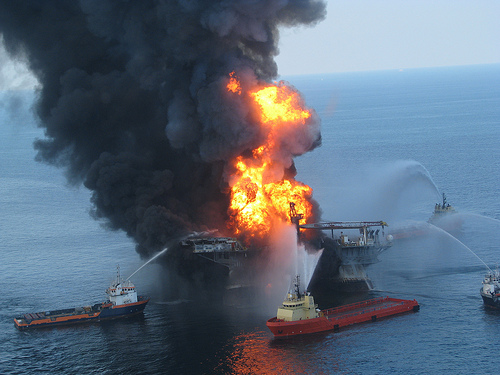
<a href="http://www.flickr.com/photos/ideum/4711481781/sizes/m/in/photostream/">ideum</a>/Flickr
The Bureau of Ocean Energy Management, Regulation and Enforcement released its new five-year plan for drilling in the Outer Continental Shelf on Tuesday, its first plan since the Deepwater Horizon spill last year. But BOEMRE’s economic analysis used to create the plan does not factor in a 4.9 million barrel spill.
The 28-page Economic Analysis Methodology from BOEMRE looks at the net economic and social value of the proposed 5-year plan. As the paper states, “The largest social and environmental costs modeled for the 2012-2017 proposed program decision document are OCS oil spills and air emissions.” The agency also includes this handy formula:
Spill risk = probability of spill x impacts of spill
But then the feds note that their analysis of this latest plan for offshore drilling does not include the Deepwater Horizon spill:
The spill rates and size of spills are based upon all OCS spills from 1964-2010 excluding the catastrophic Deepwater Horizon (DWH) event.
It continues:
The BOEM is using the oil spill rate from the entire history of available program data, excluding DWH, as a rough balance between the remote chance of another DWH event and the otherwise much safer performance reflected in the more recent period.
Hmmm. I seem to recall government officials making similarly optimistic statements about the size and threat level of spills before the Deepwater Horizon.
The Press-Register in Alabama also flagged this on Wednesday. Now, the OCS plan and various related reports don’t leave out the spill altogether. The announcement included a 1,492-page draft environmental impact analysis that includes data on how the April 2010 spill impacted bird and turtle species, and recounts studies on its impact at the shore and out at sea. It’s just the economic case that leaves it out, which has provoked some environmental groups to ask whether the Department of Interior is really being honest about the risks.
“By omitting the nation’s largest environmental disaster from its calculation of the environmental costs of drilling, BOEMRE continues to bury its head in the sand and pretend that the Deepwater Horizon accident never happened,” said Catherine Wannamaker, a senior attorney with the Southern Environmental Law Center, in an email. “BOEMRE tries to move forward without truly accounting for these risks and costs—this is not a responsible course of action for a supposedly reformed agency.”












